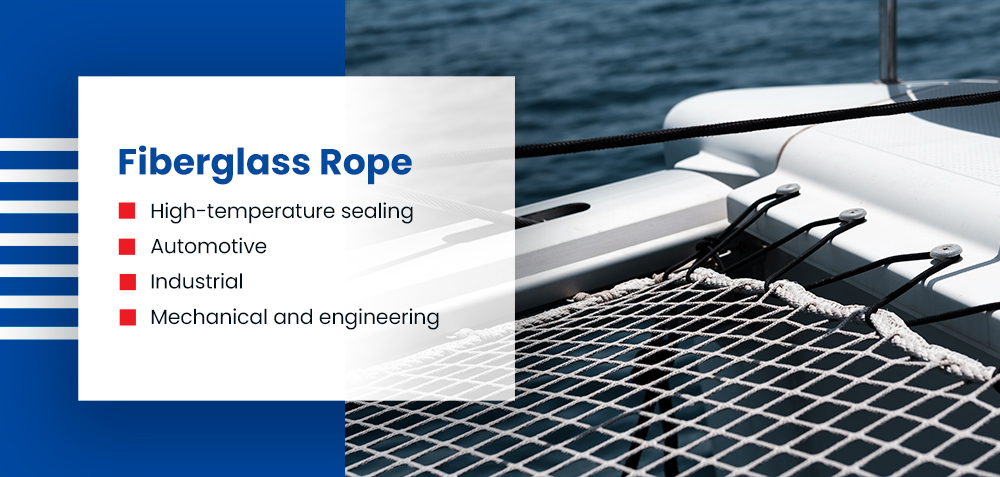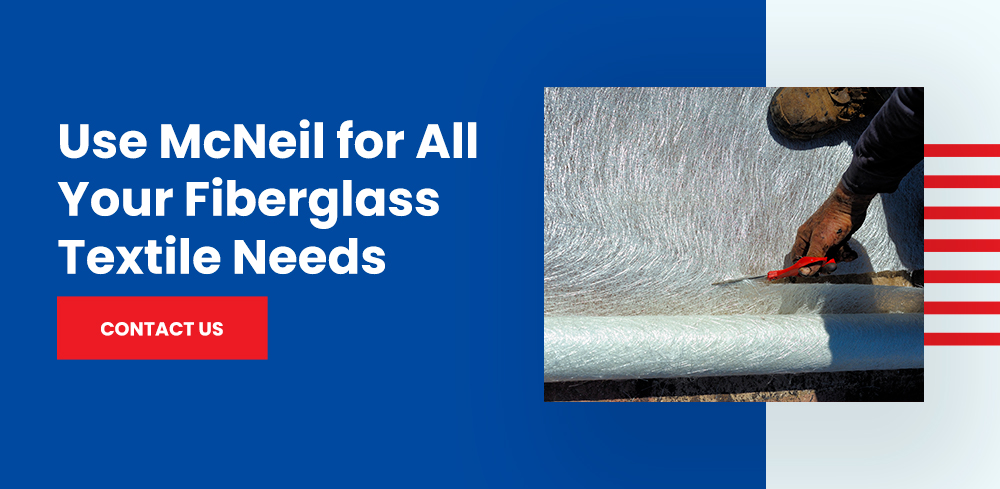Where Are Fiberglass Gaskets Used?

Fiberglass is a highly durable, heat-resistant sealant. Its flexibility and versatility make it the premier choice for sealing and high-temperature applications across dozens of industries. Gaskets are subjected to extreme conditions — failure can be catastrophic. If you want to ensure safety and efficiency, using one of the many fiberglass sealing options helps protect your product, employees and facility from harm while maximizing productivity.
Explore the various fiberglass products and their uses as gasket materials to find the best fiberglass gasket for your needs.
Fiberglass Cloth
Fiberglass cloth is a woven composite fabric made from fiberglass strands. Using fiberglass makes this material extremely versatile — its flexibility, durability and strength make it applicable across many industries. Fiberglass’ heat and chemical resistance make fiberglass cloth extremely popular for dozens of uses. Thanks to its high strength-to-weight ratio, you’ll see fiberglass cloth used in protective gear like helmets and body armor, surfboard manufacturing and crafting.
With so many uses and benefits, fiberglass cloth is a popular choice for many large industries. Here are some industries that commonly use it in their operations:
- Construction: Fiberglass cloth is employed in the construction industry for reinforcing materials called fiberglass-reinforced plastic (FRP) composites. FRP composites are used to build lightweight, sturdy structures like aircraft parts, boat hulls and car bodies. Additionally, fiberglass cloth is used to reinforce concrete, preventing cracking and enhancing its strength.
- Manufacturing: Another common application for fiberglass cloth is insulation product manufacturing. Fiberglass provides excellent acoustic and thermal insulation in commercial buildings, homes and industrial settings. It improves your energy efficiency and creates a comfortable home or workspace.
- Automotive: The automotive industry uses fiberglass cloth for producing durable parts like hoods, bumpers and interior panels. Fiberglass cloth’s lightweight properties contribute to fuel efficiency while maintaining structural integrity. Additionally, the automotive detailing industry uses it for color contrast and rust resistance.
- Marine: Fiberglass cloth is extremely popular in the marine industry for its high rust and corrosion resistance. Fiberglass is also used in the manufacturing of boat hulls, liners, decks, consoles and more. Even water tanks and pipes commonly incorporate fiberglass into their construction.
- Aerospace: Fiberglass cloth is essential to the aerospace industry. Its lightweight, heat-resistant nature makes it ideal for aerospace test equipment, enclosures and ducting. Fiberglass fabric is also found in jet engines and aircraft interiors.
Fiberglass Tape
Fiberglass tape is made from many twisted fiberglass strands. These fibers are woven together to create highly durable tape. Selvage edges prevent the tape from unraveling. Its strength helps it withstand severe stressors, and its self-adhesive properties make it a convenient, lasting tape for many uses.
There are numerous practical applications for fiberglass tape. Here are some of the industries that take advantage of its beneficial properties:
- Construction: Fiberglass tape is often used for drywall finishing and repairs. When embedded in the joint compound, it reinforces seams between drywall sheets — this prevents cracks and provides a smooth surface for wallpapering or painting. Fiberglass’ moisture resistance makes it useful in damp-prone areas like kitchens and bathrooms.
- Electrical: Fiberglass tape plays a critical role in electrical insulation. Its nonconductive properties make it ideal for wrapping and insulating cables, wires and electrical components. Wrapping components with fiberglass tape helps ensure safety and efficiency in electrical systems.
- Automotive and aerospace: Fiberglass tape is used for composite material reinforcement in both the automotive and aerospace industries. Fiberglass tape helps enhance structural integrity while keeping components’ weight to a minimum for improved performance and fuel efficiency.
- Plumbing: Fiberglass tape works well for repairing leaking pipes and fittings. When coated with adhesive, fiberglass tape is a reliable solution for temporarily sealing leaks until more permanent repairs can occur.

Fiberglass Rope
Fiberglass rope is a woven, nonflammable silica yarn used as sealing and gasket material. Fiberglass rope’s strong, lightweight properties make it useful in many industries across applications, including:
- High-temperature sealing: Fiberglass is heat-resistant and nonflammable, making it a valuable tool for high-temperature sealing and insulation. Fiberglass rope is used to create tight seals in boilers, ovens, furnaces and wood-burning stoves. This prevents heat loss and ensures efficiency.
- Automotive: In the automotive industry, fiberglass rope is employed as a gasket material in exhaust systems and engines. Its ability to withstand extreme temperatures and resist chemical damage makes it ideal for intense environments.
- Industrial: Industrial settings also use fiberglass rope for a variety of applications. One primary use is sealing doors and access points to prevent heat or cold from escaping and control temperature.
- Mechanical and engineering: Fiberglass rope’s durable sealing properties make it an effective protectant against debris, leaks and dust in mechanical and engineering applications.
Fiberglass Tadpole Tape
Fiberglass tadpole tape — or tadpole gasket tape — is a specialized sealing material designed to provide a high-pressure, high-temperature seal for many industrial applications. Tadpole tape gets its name from its unique appearance — its round section and thin tale resemble a tadpole. The bulbous section of tadpole tape is typically made from fiberglass rope to provide advanced heat resistance and compression capabilities. The tail is made from more flexible materials like neoprene, rubber or silicone.
Fiberglass tadpole tape conforms to irregular surfaces. Compressing the bulb creates an insulating seal fixed in place by the tail. It’s used for a few different applications:
- High-temperature: Fiberglass tadpole tape’s flexibility and ability to withstand high pressure and thermal cycling make it popular in critical sealing applications where traditional gaskets might fail. Its extreme temperature resistance lets it work well in boilers, furnaces, high-temperature piping systems and industrial ovens.
- Sealing: The energy, automotive, manufacturing and aerospace industries use fiberglass tadpole tape where reliable sealing against liquid, heat and gas is essential for ensuring safe and efficient equipment and machinery operation. Its unique design and high-performance properties make fiberglass tadpole tape valuable for sealing applications.
Fiberglass Thread
Fiberglass thread is formed by stringing together fiberglass filaments. These filaments usually have an added coating to reduce friction and improve functionality. Stringing fine fiberglass fibers together makes a thread with superior heat resistance and high tensile strength. Fiberglass thread is used in the following applications:
- Composite construction: Fiberglass thread helps reinforce materials like FRPs and creates strong, lightweight structures for the aerospace and automotive industries.
- Fire-resistance: Using fiberglass thread can help improve the fire-resistance of fabrics, protective clothing and filtration systems.
- High-temperature needs: Heat-resistant applications will use fiberglass thread in thermal insulation materials for furnaces, automotive components and industrial ovens.
Use McNeil for All Your Fiberglass Textile Needs
With over 80 years of industrial heat-management construction and installation experience, you can trust McNeil to deliver the lasting, quality materials you need. Our superior fiberglass and silica textiles provide unmatched protection and sealing in high-temperature environments. McNeil’s fiberglass sleeves, cloth, rope and tape all display the low conductivity, high mechanical strength and excellent spark resistance needed to withstand environmental stressors. If you’re interested in our fiberglass textiles or need our repair and installation services, contact us online today.




